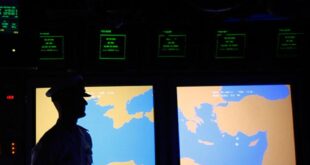
Bottom Line Up Front
The domestic challenges posed by the COVID-19 outbreak and social unrest in the United States are necessitating Trump administration adjustments to policy in the Middle East.
The twin crises are likely to limit the Trump administration’s willingness to address tensions with any of its regional adversaries.
The Trump administration’s drive to limit the pandemic’s economic damage has caused strains with Saudi Arabia and other Persian Gulf oil producers.
The unrest sparked by police brutality against African-Americans weakens the United States’ ability to improve governance and human rights practices around the world, including in the Middle East. .
As the Presidential election approaches in November, President Trump is attempting to manage two simultaneous domestic crises, the combination of which has implications for U.S policy in the Middle East. Primarily, the Trump administration seeks to prevent the eruption of a regional crisis in the Middle East that would divert attention from its domestic affairs, or create the impression that the administration’s Middle East policy faces significant difficulties abroad. At the same time, the administration has not sharply or clearly shifted any of its regional priorities and policies, suggesting that any U.S regional policy alterations might only last until the pandemic and demonstrations over racial equality wind down.
The policy goal of preserving the status quo in the Middle East is being implemented along several pillars. The Trump administration is seeking to ensure that U.S.-Iran tensions that erupted into hostilities in early 2020 do not escalate into a direct and prolonged conflict. Whereas Washington has not formally eased its ‘maximum pressure’ campaign against Tehran, in May the United States supported providing humanitarian relief to help Iran deal with the COVID-19 outbreak, although Iran did not accept the aid. Also in May, the United States undertook negotiations with Iran for the release of Navy veteran Michael White, held in Iran since the summer of 2018 and released last week. Later this month, the United States plans to hold a ‘strategic dialogue’ with Iraq that is intended, in part, to enlist Baghdad’s cooperation in preventing further attacks on U.S. forces by Iran-backed militia groups there. Attacks by such groups led to the U.S.-Iran hostilities that took place in January, and which were fought out on Iraqi territory. And, Secretary of State Mike Pompeo visited Israel in May to warn the new Israeli government against setting off a new crisis by moving ahead quickly on its planned de-facto annexation of large parts of the West Bank. The overture to Israel deviated from the Trump administration’s record of unquestioned support for Israel, which took the form of recognizing Israel’s declaration of sovereignty over the Golan Heights and the movement of the U.S. Embassy to Jerusalem. The Secretary also reportedly warned Israeli leaders not to escalate attacks on Iranian positions in Syria or on Iranian allies to the point of sparking a regional war.
The economic and financial costs of the U.S. response to the pandemic have impacted regional policy as well. The collapse of oil prices that resulted from the COVID-19 outbreak threatened the viability of domestic U.S. shale oil producers, and caused President Trump to pressure his erstwhile strong ally, Saudi Crown Prince Mohammad bin Salman (MbS), to agree to production cuts that have helped prices recover. The new political distance between the Trump administration and MbS – a change from the first three years of the U.S. administration – has also led the United States to place renewed pressure on Saudi Arabia and the United Arab Emirates to resolve their three year-long rift with neighboring Qatar. It is also likely that the estimated $3 trillion in new U.S. domestic spending to combat the effects of the pandemic will necessitate cuts in U.S. foreign aid to the region, as well as in defense spending. The requirement for defense cost savings – as well as President Trump’s push to show progress on his key promises before the November election – might also account for the President’s reported drive to end the U.S. military presence in Afghanistan before the U.S. election.
The domestic unrest caused by a Minneapolis police officer murdering George Floyd, and the Trump administration’s bungled response and subsequent protests, has opened the United States to the very same human rights criticisms that it often levels against the region’s regimes, especially Iran. The leaders of Iran and other regional U.S. adversaries have cited the U.S. unrest as disqualifying American claims to moral authority and its criticism of poor governance, human rights abuses, and social inequities in the region. The degree to which the United States is able to respond with tangible progress toward police reform, criminal justice reform, and social reform might determine whether the United States can positively influence governance and human rights in the region, among U.S. partners, as well as adversaries.
 Eurasia Press & News
Eurasia Press & News



